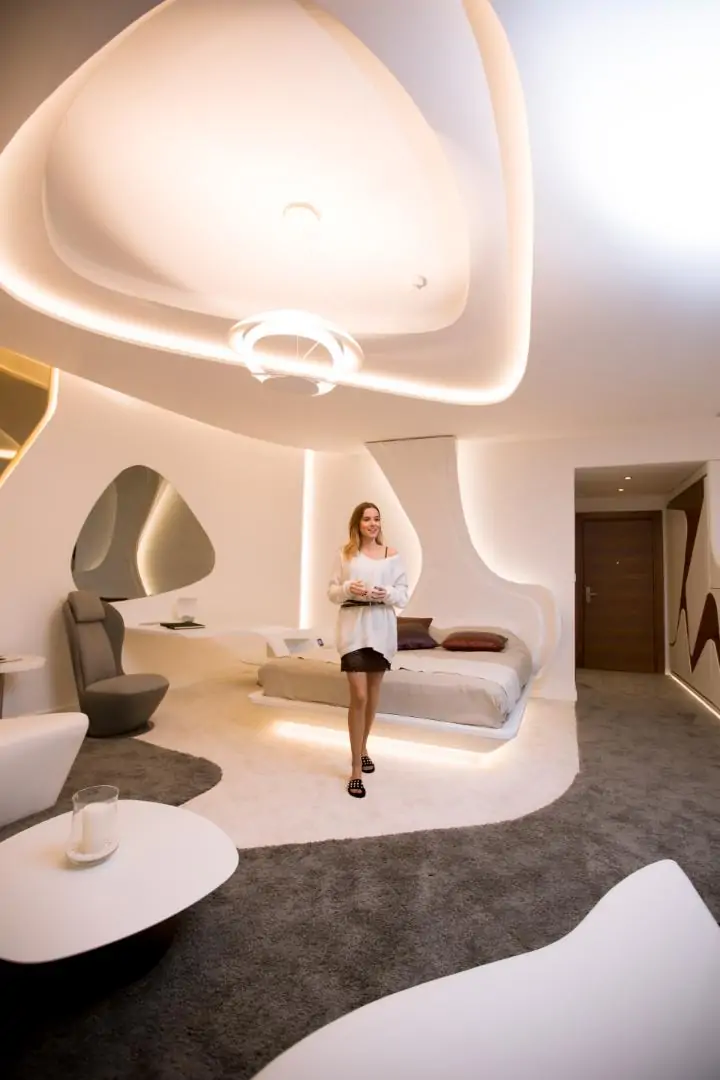
Smart Room Technology in 2025
Table of Contents
ToggleAs we move further into the digital age, smart room technology is revolutionizing the in-room guest experience.
These high-tech accommodations are designed to offer unparalleled convenience, comfort, and customization, making them a standard feature for tech-savvy travelers in 2025.
Customizable Environmental Controls
Smart rooms provide guests with full control over their environment. Using either mobile apps, in-room tablets, or voice-activated systems, travelers can adjust the following:
- Lighting: Guests can choose lighting intensity, color, and mood settings to suit their preferences, whether it’s a soft glow for relaxation or bright light for productivity.
- Temperature: Smart thermostats allow precise adjustments, ensuring the room’s climate is always ideal. Some systems can even adapt based on the guest’s activity, such as lowering the temperature during sleep.
- Window Treatments: Automated blinds or curtains can be controlled remotely, allowing guests to manage natural light without leaving their bed.
Advanced Entertainment Options
Entertainment systems in smart rooms are designed to meet the needs of modern travelers who expect personalized and immersive experiences. Features include:
- Streaming Services Integration: Smart TVs and entertainment hubs allow guests to access their favorite streaming platforms like Netflix, Hulu, or Spotify directly from the in-room system.
- Wireless Casting: Guests can seamlessly connect their smartphones or laptops to the TV for gaming, presentations, or watching personal content.
- Surround Sound Systems: High-quality audio systems enhance the experience of watching movies, listening to music, or even meditating.
Voice-Controlled Technology
Voice-activated assistants, such as Amazon Alexa or Google Assistant, are becoming integral components of smart rooms. Guests can issue voice commands for tasks like:
- Turning lights on or off.
- Adjusting the thermostat.
- Setting alarms or reminders.
- Playing music or podcasts.
- Requesting hotel services, such as extra towels or room cleaning.
These assistants are designed to provide a hands-free, intuitive experience, enhancing both convenience and accessibility.
Smart Furniture and Fixtures
Beyond the basics, hotels are incorporating innovative smart furnishings to enhance functionality and aesthetics:
- Smart Desks: Integrated with charging ports, wireless chargers, and adjustable lighting for remote workers or business travelers.
- Adjustable Beds: Some smart rooms offer beds that can change firmness, elevate head or foot positions, or even track sleep quality to ensure a restful stay.
- Multi-Functional Mirrors: Interactive mirrors can display weather updates, news, or fitness instructions, doubling as a tech feature and a practical necessity.
Personalized Guest Profiles
Smart rooms are equipped with systems that can remember guest preferences from previous stays. Upon check-in, the room automatically adjusts to their stored settings for:
- Favorite temperature and lighting.
- Preferred entertainment channels or playlists.
- Morning routines, such as coffee-making schedules or wake-up alarms.
This level of personalization creates a “home away from home” feeling and fosters guest loyalty.
Energy Efficiency and Sustainability
Smart room technology is not only guest-centric but also eco-friendly. These systems optimize energy usage through:
- Motion Sensors: Lights and climate control automatically turn off when the room is unoccupied.
- Energy Tracking: Guests can monitor their energy usage and participate in sustainability initiatives by choosing eco-friendly settings.
- Smart Water Systems: Showers and faucets equipped with flow regulators help conserve water without compromising comfort.
Integrated Hotel Services
Smart rooms are seamlessly connected to the hotel’s broader ecosystem, enabling guests to interact with hotel services effortlessly:
- Room Service Orders: With a few taps or voice commands, guests can place orders directly from their room.
- Booking Amenities: Spa sessions, gym slots, or dining reservations can be scheduled through the smart system.
- Maintenance Requests: Guests can report issues, such as a malfunctioning appliance, and track the service response in real-time.
Safety and Security
Security features in smart rooms are designed to protect guest privacy and ensure peace of mind:
- Digital Door Locks: Keyless entry through smartphone apps or biometrics enhances safety and convenience.
- Camera-Free Systems: Many smart room systems are built with guest privacy in mind, avoiding intrusive surveillance.
- Emergency Alerts: Smart systems can notify guests of emergencies, such as fire alarms, directly through their connected devices.
offering an elevated level of customization, convenience, and comfort. By incorporating these advanced features,
hotels can attract tech-savvy travelers, streamline operations, and contribute to sustainability efforts,
ensuring they remain competitive in the modern era.
